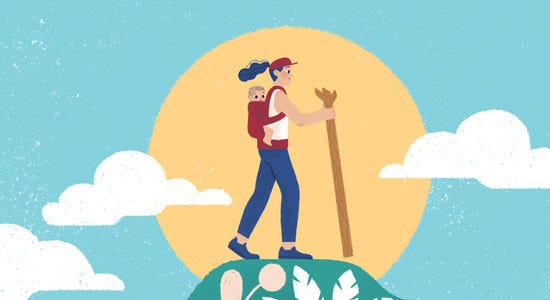
Fill Hearts, Not Landfills
“As a company that cares deeply about babies, it is also our responsibility to care for the planet they will inherit from us. With Everlove by Ergobaby, our commitment to quality enables us to move towards sustainability, by extending the use of our carriers and making them accessible to more families. It’s a win-win for our children and planet.”
- Jason Frame, CEO of Ergobaby

Since Ergobaby was founded, our goal has been to make the most durable, comfortable, and longest lasting carriers in the world.
The good news is that all of our years of committing to quality have built carriers that just won’t quit; but the reality is that most babies only need them for a year or two. This situation has led us to a new promise to our customers and planet: working to make sure Ergobaby carriers get more use - more adventures and more snuggling by more families.
Everlove provides an easy way for Ergobaby parents to get a guaranteed buy back price on used baby carriers in good condition.
This keeps them in use by providing the opportunity for another family to purchase a genuine, certified Ergobaby carrier. With Everlove, we can take immediate responsibility for up to 96% of the carriers we’ve ever made. When we compare the impacts of the materials required to make a new carrier with the opportunity to purchase a used carrier, we estimate that Everlove Ergobaby carriers save up to 96% of energy use, 95% of water use and 84% of CO2.*
Ergobaby believes we must take a greater responsibility for our company's impact on the planet which our children will inherit from us.
By participating in this more sustainable economic model which reuses and extends the lifetime of our product, we reduce the need to make more things. According to the Ellen MacArthur Foundation, this circular economy has the potential to reduce CO2 emissions by 48% by 2030.**
We know we’ve still got a long road ahead of us to become a truly sustainable brand including improving our material sourcing, energy use in manufacturing, packaging and transportation of our products. Although we are committed to making these changes, we also know that they can take years and may only address a few lines of carriers at a time which is why we’ve started with our best foot forward: getting more use out of the carriers we’ve already made. Based on research by WRAP UK, when compared with implementing good environmental practices across the lifetime of the product, keeping items in use generates the greatest reductions in carbon, water and waste - 20-30% each.*** We couldn’t possibly pass up this opportunity to act fast and create immediate change.
As the first brand in the baby space to take back and resell our products, we thank our Everlove by Ergobaby families for participating in and supporting our efforts in working towards a more sustainable world for our children. We appreciate your previously loved baby carriers and your willingness to extend your baby carriers’ lifecycle by shopping used - we couldn’t do it without you.
* These savings were derived from estimates of raw material production used in Ergobaby production of Omni Mesh and Omni Cotton carriers compared to the transportation and cleaning impacts associated with used carriers. They do not include the cut and sew process at an Ergobaby factory or the scrap material generated during manufacturing. The impacts of used carriers are based on the shipping impacts of collection and cleaning, as well as the cleaning process itself; impacts of repair are excluded at this point in the study. The calculations do not attribute any of the impacts of making the carrier to the used carrier and we acknowledge that this is an over-simplification; however, at this time there is not a standard portion of initial manufacturing impacts that can be attributed to a used product. Packaging is currently excluded from this scope.
** https://www.ellenmacarthurfoundation.org/circular-economy/what-is-the-circular-economy cited in January, 2019
*** Valuing our clothes: The true cost of how we design, use and dispose of clothing in the UK. WRAP, 2012.